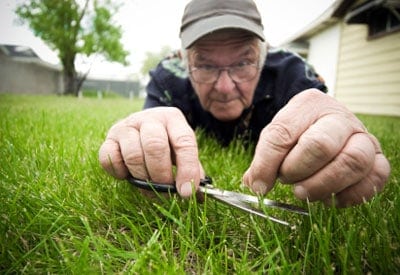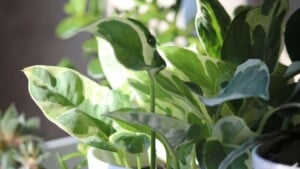1. Before watering your lawn, check the soil moisture with a trowel. The top 2-3 inches should feel almost dry before adding any more water.
2. After watering, test the soil. If it isn’t wet 4-6 inches down, continue watering until it is. Grass roots will grow deeper and the lawn will be healthier.
3. Compost improves soil structure, texture, and aeration, and increases the soil’s ability to hold water. Add compost (no more than 1/2 inch) to the lawn to make your grass healthier.
4. Keep weeds from going to seed. If you can reduce the number of weed seeds in and around your lawn, you’ve won half the battle.

A BESTSELLER!
Organic Weed & Feed
Use to prevent crabgrass, dandelions and more! Pelleted for easy application.
$14.95Learn moreAn all-natural organic weed and feed for use on lawns. Weed Prevention Plus (8-2-4) provides a fast green-up and will not burn. Prevents crabgrass, dandelions and many other common weeds. Pelleted for easy application. Safe for people, pets and wildlife. Each 25 lb bag covers 1500 square feet.
5. Thatch will not form from cut grass. Instead, the lawn clippings will attract earthworms, which break down thatch.
6. Remove thatch in the spring or early summer using a rake or a tool especially designed to remove that matted, dead grass.
7. Watering between 4 and 9 a.m. helps ensure that the sun won’t rob moisture from your lawn.
8. Compost is not a fertilizer. It builds up organic matter in the soil.
9. Organic lawn fertilizers release nutrients slowly over time, allowing the grass to absorb nutrients more efficiently.
10. Lawn clippings can provide most of the nutrients needed by grass if they are small enough to decompose quickly (see Grasscycling). Remove only 1/3 of the grass blade at any one mowing.
11. Synthetic fertilizers, if misapplied, can kill soil life and ruin soil structure in even the best soils.
12. The best time to treat weeds is early in their life cycle. That means applying organic weed killers to grassy weeds, like crabgrass, in the spring and to broadleaf weeds, such as dandelions, in the fall.
13. Pull weeds after a rain or watering – it’s easier and you are more likely to get the entire root.
14. A 5% increase in organic material quadruples the soil’s ability to store water. This is especially important for lawns growing in dry climates.
15. Another reason to use organic fertilizers and soil amendments on your lawn is that earthworms love them! Do all you can to encourage earthworms in your soil.

OMRI LISTED
Bio-Turf (8-3-5)
Keeps your yard looking good through the ups and downs that each year brings.
$15.50Learn moreIf children and pets are playing outside, you deserve to have lush grass and a chemical-free yard. Down To Earth® Bio-Turf Lawn Fertilizer is easy to apply for long-lasting fertilization. It’s NPK ratio promotes strong growth and keeps your yard looking good through the ups and downs that each year brings.
16. Fertilize before a rain whenever possible.
17. Pest control begins with healthy soil. It produces healthy lawns, which are better able to withstand disease and insect damage.
18. Bare spots on your lawn? Find an interesting native ground cover and plant it in an appealing design on the bare spot.
19. Less than 2 percent of the insects found in your lawn are harmful. Most are considered beneficial.
20. Infrequent watering forces grass roots to go deep into the soil – deeper than most weed roots will go.
21. Soil surfaces that remain moist create ideal conditions for shallow-rooted weeds (such as crabgrass), and various lawn diseases.
22. Whenever possible use organic fertilizers. Chemicals build up toxicity in soil, which can leach into drinking water.
23. Aerate lawns where water pools and grass looks thin. If you can’t push a screwdriver into the soil 5-6 inches, it’s time to aerate.
24. Scatter crocuses throughout your lawn to add early color to your landscape. By the time the grass comes up and needs to be mowed, the crocuses will have died back down and disappeared.
25. Remember your lawn mower when you are planning a new garden in your backyard. Use the mower to make sure the curves are easy to follow and easy to maintain.












